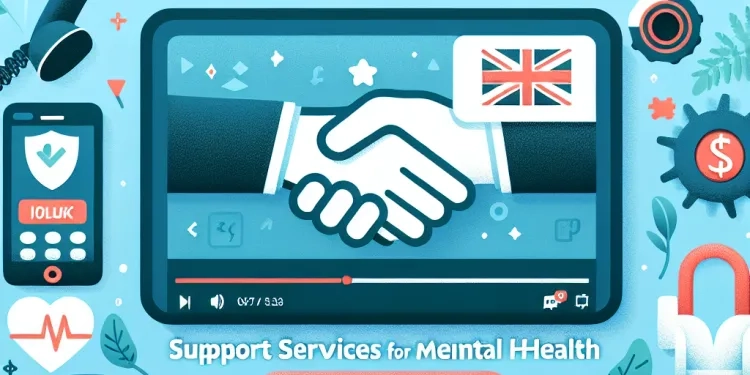
Find Help
More Items From Ergsy search
-

Mental Health Impact of Cost of Living Crisis and Support Resources
Relevance: 100%
-

Addressing the Cost of Living Crisis: Community Support and Resources
Relevance: 79%
-

Accessing Mental Health Support Resources in the UK
Relevance: 67%
-

Mental Health Support Resources in the UK
Relevance: 65%
-

Mental Health Support for Families: Resources and Guidance
Relevance: 63%
-

Mental Health Support Resources for Families
Relevance: 62%
-

Mental Health Support for Families: Resources and Strategies
Relevance: 62%
-

Mental Health Support for Families: Resources and Helplines
Relevance: 61%
-

Mental Health Resources for Families
Relevance: 61%
-

Navigating the UK Cost of Living Crisis: Tips for Families
Relevance: 59%
-

Mental Health Support Services in the UK
Relevance: 58%
-

Mental Health Support for Families - Latest Resources and Guidance
Relevance: 57%
-

Advancements in Mental Health Resources for Families
Relevance: 55%
-

Addressing the Rising Cost of Living: Community Support and Resources
Relevance: 54%
-

Essential Tips for Mental Health and Well-Being Amidst Rising Living Costs
Relevance: 50%
-

Impact of Rising Living Costs on Family Health
Relevance: 50%
-

What mental health resources are available for seniors?
Relevance: 47%
-

Support Services for Mental Health Amid Economic Uncertainty
Relevance: 46%
-

Navigating Mental Health Services for Children and Adolescents
Relevance: 46%
-

Can primary care support workers access mental health support?
Relevance: 44%
-

NHS Unveils Revolutionary Mental Health Support Initiative
Relevance: 43%
-

How Rising Living Costs Are Impacting Family Wellbeing
Relevance: 41%
-

Financial Support for Families Amid Rising Cost of Living
Relevance: 41%
-

Impact of UK Housing Crisis on Local Communities
Relevance: 40%
-

Impact of Cost of Living on UK Communities
Relevance: 40%
-

Mental Health Services Struggle to Cope Amid Record Demand
Relevance: 40%
-

Understanding Mental Health in Children
Relevance: 39%
-

Tackling Youth Mental Health: Community Initiatives and Solutions
Relevance: 38%
-

Cost of Living Crisis: Supermarkets Promise More Discounts for Shoppers
Relevance: 38%
-

Understanding the Impact of Rising Living Costs on Family Welfare
Relevance: 37%
-

Charities Warn of Food Insecurity Amidst Rising Cost of Living
Relevance: 36%
-

UK's Elderly Population Faces Growing Loneliness Crisis
Relevance: 36%
-

Mental Health: Laura's Story | NHS
Relevance: 36%
-

Addressing the Rising Homelessness Crisis
Relevance: 35%
-

Current Challenges in Youth Mental Health Services
Relevance: 35%
-

Addressing the Housing Crisis: Current Challenges and Solutions
Relevance: 34%
-

When will I receive the £500 cost of living payment?
Relevance: 34%
-

What is the £500 cost of living payment?
Relevance: 34%
-

Is the £500 cost of living payment taxable?
Relevance: 34%
-

Is the £500 cost of living payment taxable?
Relevance: 33%
Mental Health Impact of Cost of Living Crisis and Support Resources
The Mental Health Impact of the Cost of Living Crisis
The cost of living crisis in the United Kingdom has become a pressing concern for many individuals and families. With rising expenses for basic necessities such as housing, food, and utilities, the financial strain can become overwhelming. This economic pressure can lead to significant mental health challenges, including anxiety, depression, and stress. As people struggle to make ends meet, the uncertainty about the future and the constant worry about finances can adversely affect mental well-being. The fear of losing one's home, the inability to afford nutritious food, and the strain on relationships due to financial stress all contribute to a deteriorating mental health landscape.
Recognizing the Signs of Mental Health Struggles
It is crucial to recognize the signs of mental health struggles stemming from financial stress. Symptoms such as constant worry, irritability, changes in sleeping or eating patterns, loss of interest in previously enjoyed activities, and feelings of hopelessness are all indicators that the financial strain is impacting mental health. Early recognition and intervention are key to preventing these issues from escalating. If you or someone you know is showing these signs, seeking help from a mental health professional is essential.
Support Resources Available
There are several resources available in the United Kingdom that provide support for those experiencing mental health issues due to the cost of living crisis. Organizations such as Mind, Samaritans, and the NHS offer a range of services including helplines, counselling, and therapy. Mind provides information and support for those dealing with mental health problems, including advice on managing money-related stress. The Samaritans offer a 24/7 helpline for anyone struggling to cope, and the NHS provides access to mental health services through GPs or self-referral. Additionally, financial planning resources and debt advice charities such as StepChange can help alleviate financial pressure and provide guidance on managing debt, which in turn can improve mental well-being.
Community and Online Support
In addition to professional resources, community and online support can be invaluable. Local community centres often have support groups and activities that can provide emotional support and practical advice. Online forums and support groups also offer spaces where individuals can share experiences, tips, and encouragement, which can help reduce feelings of isolation. Websites like the Money Advice Service offer free advice and articles to help individuals understand and improve their financial situation.
Conclusion
The cost of living crisis in the UK has notable effects on mental health, but recognizing the issue and seeking help can make a significant difference. Utilizing both professional services and community resources can provide essential support. By addressing both financial and mental health challenges, individuals and families can work toward a more stable and healthier future.
Mental Health Impact of Cost of Living Crisis and Support Resources
The Mental Health Impact of the Cost of Living Crisis
The cost of living crisis in the United Kingdom is a big problem for many people and families. Things like housing, food, and utilities are getting more expensive. This financial pressure can make people feel very stressed, anxious, or depressed. Worrying about money all the time can make people feel uneasy about the future. This can make mental health worse. People might fear losing their homes or not being able to buy healthy food. Money problems can also make it hard for people to get along with family and friends.
Recognizing the Signs of Mental Health Struggles
It is very important to notice when someone is having mental health issues because of money troubles. Some signs to look out for are always worrying, feeling grumpy, changing sleeping or eating habits, losing interest in fun activities, and feeling hopeless. It is important to see these signs early and get help. If you or someone you know is showing these signs, it is important to talk to a mental health professional.
Support Resources Available
In the United Kingdom, there are resources to help people with mental health problems because of money worries. Organizations like Mind, Samaritans, and the NHS offer services such as helplines, counselling, and therapy. Mind gives information and support for mental health and advice on managing money stress. Samaritans have a 24/7 helpline for people who need to talk. The NHS provides mental health services through doctors or on your own. Financial planning resources and debt advice charities like StepChange can also help with money problems, which in turn can help mental health.
Community and Online Support
Besides professional help, community and online support can be very helpful too. Local community centres often have support groups and activities that offer emotional support and practical tips. Online forums and support groups are places where people can share experiences and advice. This can help people feel less alone. Websites like the Money Advice Service have free advice and articles to help people understand and improve their money situation.
Conclusion
The cost of living crisis in the UK affects many people's mental health, but there are ways to get help. Recognizing the problem and seeking support are important steps. Using both professional services and community resources can provide the help that is needed. By dealing with money and mental health problems, people and families can work towards a more stable and healthier future.
Frequently Asked Questions
What is the cost of living crisis?
The cost of living crisis refers to the situation where household costs, including housing, food, energy, and other essentials, rise faster than incomes, making it difficult for people to maintain their standard of living.
How does the cost of living crisis affect mental health?
The financial stress caused by the cost of living crisis can lead to increased anxiety, depression, and other mental health issues. People may feel overwhelmed, helpless, and worried about their future.
What are the common signs of financial stress impacting mental health?
Common signs include constant worry, difficulty sleeping, changes in appetite, feeling irritable or angry, difficulty concentrating, and a sense of hopelessness.
Where can I get help for mental health issues related to financial stress?
You can reach out to mental health charities such as Mind or Samaritans, as well as your GP, who can refer you to appropriate mental health services.
Are there financial support resources available in the UK?
Yes, resources such as Citizens Advice, Turn2us, and StepChange provide financial advice and support for those struggling with debt and financial problems.
Can talking to someone help alleviate financial stress?
Yes, talking to a trusted friend, family member, or a mental health professional can help you feel supported and less isolated. Professional counselling can provide strategies to manage stress and anxiety.
What are some self-care strategies for managing stress related to the cost of living crisis?
Self-care strategies include maintaining a healthy routine, exercising regularly, eating well, getting enough sleep, practicing mindfulness, and doing activities you enjoy.
How can I budget better to reduce financial stress?
Creating a realistic budget, tracking your spending, identifying essential and non-essential expenses, and seeking advice from financial counsellors can help manage your finances more effectively.
Can community resources help during the cost of living crisis?
Yes, local food banks, charities, and community organisations often have resources and support available for those in need. Community centres may also offer advice and access to services.
Are there any government schemes to help with the cost of living in the UK?
Yes, the UK government offers various benefits and grants such as Universal Credit, Housing Benefit, and the Warm Home Discount to assist those struggling with living costs.
What role can employers play in supporting employees struggling with the cost of living?
Employers can offer financial wellness programs, provide access to Employee Assistance Programs (EAPs), offer flexible working arrangements, and ensure fair wages to help support their employees.
What is the impact of debt on mental health?
Debt can significantly impact mental health, leading to stress, anxiety, depression, and even suicidal thoughts. It's important to seek support if debt is affecting your well-being.
How can I manage anxiety related to financial uncertainty?
Managing anxiety involves identifying stressors, practicing relaxation techniques, seeking support from friends or professionals, and taking practical steps to improve your financial situation.
What are some signs that someone I know might be struggling with financial stress and mental health issues?
Signs include changes in behaviour, withdrawing from social interactions, mood swings, expressing worries about money, and noticeable changes in appearance or habits.
What should I do if I'm in crisis and need immediate mental health support?
If you're in crisis, contact emergency services by calling 999 or go to your nearest A&E. You can also contact Samaritans on 116 123 or text SHOUT to 85258 for immediate support.
What is the cost of living crisis?
The cost of living crisis means that things like food, rent, and bills are getting more expensive. People might find it hard to pay for the things they need.
If you need help with money, you can talk to someone you trust or use a calculator to see how much money you have and what you spend.
The cost of living crisis means things like houses, food, and energy are getting expensive very quickly. But people's money is not going up as fast. This makes it hard for people to pay for what they need.
Tips to help:
- Keep track of what you spend. Write it down or use a money app.
- Look for sales or discounts when you shop.
- Try to save energy at home, like turning off lights.
How does the cost of living crisis affect mental health?
The cost of living means how much it costs to buy things like food, pay for a house, and buy clothes. Sometimes, the prices for these things go up a lot. This is called a "cost of living crisis."
When things cost more money, it can make people worry. They might feel stressed and upset because they have to think a lot about money. This can affect their mental health.
Talking to someone you trust can help if you feel worried. You can also try drawing, writing, or doing something fun to feel better. If it's hard to understand or read big words, using pictures or asking someone to read with you can help too.
Money problems can make people feel very worried and sad. This is happening because things cost more money now. People might feel scared, upset, or unsure about what's going to happen next.
What signs show money worries are affecting your feelings?
Money problems can make you feel bad in some ways. Look for these signs:
- Feeling worried or sad a lot
- Having trouble sleeping
- Being angry or upset easily
- Finding it hard to make decisions
- Getting headaches or stomachaches
- Not wanting to do things you usually enjoy
If you feel this way, talking to someone can help. You can also use calming practices like deep breathing or writing your thoughts down.
Some common signs are:
- Worrying a lot.
- Having trouble sleeping.
- Eating more or less than usual.
- Feeling grumpy or angry.
- Finding it hard to focus.
- Feeling like things will never get better.
Here are some things that might help:
- Try to talk to someone about how you feel.
- Write down your thoughts in a journal.
- Do something you enjoy, like drawing or playing a game.
- Make sure you get enough sleep.
- Take deep breaths to calm down.
Who can help me if I feel worried about money and my mental health?
You can talk to mental health charities like Mind or Samaritans. You can also go to your doctor, who can help you find the right mental health services.
Can you get money help in the UK?
Do you want to know if you can get money help in the UK?
Yes, there are places that can help you with money. Here are some tips:
- Look online for websites that say they can help with money
- Ask someone you know or trust to help you find money help
- Call a helpline to ask about money help
Remember to ask questions if you do not understand something. It's okay to ask for help.
Yes, places like Citizens Advice, Turn2us, and StepChange can help. They give advice if you are having money problems or worries about debt.
Can talking to someone help with money worries?
Do you feel worried about money? It is okay. Many people feel this way.
Talking to someone can help you feel better. Here is what you can do:
- Find a friend or family member you trust. Share your feelings with them.
- Talk to a teacher or a counselor. They know how to help.
- Write down your worries in a notebook. This can make them easier to understand.
Remember, you are not alone. Getting help can make you feel less worried.
Yes, talking to someone you trust like a good friend, family member, or a person who helps with feelings can make you feel better and not alone. A feelings helper can show you ways to handle being worried or stressed.
How can you take care of yourself when you're worried about money?
It can be hard and stressful when things cost a lot of money. Here are some ways to feel better:
- Talk to someone: Share how you feel with a friend or family member.
- Take deep breaths: Breathing slowly can help you feel calm.
- Write it down: Keeping a diary can help you understand your feelings.
- Go for a walk: Being outside and moving your body is good for you.
- Ask for help: It's okay to need support. You can talk to a teacher or counselor.
These tips can help you feel more at ease. Remember, it’s important to look after yourself.
Looking after yourself is important. Here are some ways to do it:
- Stick to a good daily routine.
- Exercise often, like going for a walk or playing a sport.
- Eat healthy foods like fruits and vegetables.
- Get enough sleep every night.
- Try mindfulness, like taking deep breaths or meditating.
- Do things that make you happy, like drawing or playing with friends.
Remember, it's okay to ask for help if you need it. You can also use apps or tools that help you relax and stay organized.
How can I plan my money better to feel less worried?
Here are some ways to help you with money:
1. **Create a List:** Write down how much money you get and what you spend it on. This is called a budget. Use paper, a notebook, or an app to help.
2. **Basic Needs First:** Make sure to pay for important things like food and bills first.
3. **Save a Little:** Try to save some money each time you get paid, even if it's just a small amount.
4. **Ask for Help:** Talk to someone good with money, like a family member or a helper. They can give you advice.
5. **Use Tools to Help You:** Apps like calculator apps and budgeting apps can make it easier to see your money.
Remember, it's okay to ask for help and take your time. You can do it!
Make a simple spending plan. Write down how much money you have and what you spend it on. Know what things you really need and what things you don't need. If you're not sure about money, talk to someone who helps with money plans.
Can local community resources help when living costs are high?
This question asks if places or people close to you can help when things become hard to afford. Here is an easier way to understand it:
- Community resources: These are places or people nearby that can help you. This could be a local food bank, a library, or a community center.
- Cost of living: This means the amount of money needed to pay for things you need, like food, a home, or clothes.
- Crisis: This is a time when something is very hard or difficult.
So, the question is asking if the people and places in your neighborhood can support you when prices are very high.
Things that might help:
- Visit your local community center to find out what help they offer.
- Talk to friends and family about places that have free or cheap food and clothes.
- Look online for websites that show you where to get help in your area.
Yes, local food banks, charities, and community groups can help people who need it. Community centers can also give advice and help people find services.
Can the government help with living costs in the UK?
The UK government has programs to help if you need money for living costs.
Here are some things you can do:
- Check if you can get benefits or money support from the government.
- Use a calculator online to see how much money you might get.
- Ask someone you trust for help to fill out forms if needed.
- Find local charities that offer support and advice.
Yes, the UK government helps people with money through things like Universal Credit, Housing Benefit, and the Warm Home Discount. These help people who need extra money to pay for things they need.
How can bosses help workers who have trouble paying for things?
Bosses can help workers in different ways. They can give money advice programs, let workers talk to special helpers if they need support, allow flexible work hours, and pay fair wages.
How does debt affect your feelings and mind?
Debt means owing money to someone else. Having debt can make people feel sad, worried, or stressed. It happens because debt can make it hard to pay for things you need.
If you are worried about debt, here are some ways to help:
- Talk to someone you trust about your feelings.
- Make a plan to pay back the money little by little.
- Ask for help from adults or friends if you need it.
Remember, it is okay to ask for help, and you are not alone.
Owing money can make you feel very worried and sad. It can even make you think bad thoughts. If money problems are making you feel bad, it's important to ask for help.
How can I feel less worried about money problems?
It can be scary when you're not sure about money. Here are some ways to feel better:
- Make a Simple Plan: Write down what money you have and what you need to spend it on. This is called a budget.
- Talk to Someone: Share your worries with a friend or a family member. Sometimes, talking can help you feel better.
- Ask a Helper: Find a group or person who knows about money. They can give you good advice.
- Take Little Breaks: Do something fun or relaxing, like taking a walk or listening to music. This can help calm your mind.
- Use Special Tools: There are apps that can help you keep track of your money. These are like little helpers!
Remember, it’s okay to ask for help when you need it. You’re not alone!
To feel less worried, try these steps:
- Find out what makes you feel stressed.
- Learn ways to relax, like deep breathing or yoga.
- Talk to your friends or a counselor when you need help.
- Think of ways to make your money situation better.
How can I tell if a friend is worried about money and feeling upset?
Look for these signs:
- Your friend talks a lot about money problems.
- They seem very worried or upset.
- Your friend doesn’t want to do fun things anymore.
- They are not sleeping well.
- Your friend eats a lot more or a lot less than before.
Tools that can help:
- Encourage them to talk to someone they trust.
- Suggest they write down their feelings in a diary.
- Help them find a support group or counselor.
Signs to look for:
- Acting differently than usual.
- Staying away from friends and family.
- Feeling very happy and then very sad.
- Worrying a lot about money.
- Looking different or changing daily habits.
What to do if you need help right away for your feelings
If you feel very upset or in danger, you need to get help quickly. - Call emergency services, like 911, for help. - Talk to a friend or family member you trust. - Find a hotline to talk to someone who can help. It is important to find someone who can support you. You are not alone. You can also use tools like: - Calm breathing exercises - Listening to calm music These can help you feel a little better.If you are in trouble and need help fast, call 999 or go to the closest hospital A&E. You can also call Samaritans at 116 123 or send a text with the word SHOUT to 85258 to talk to someone right away.
Useful Links
Have you found an error, or do you have a link or some information you would like to share? Please let us know using the form below.
-->
This website offers general information and is not a substitute for professional advice.
Always seek guidance from qualified professionals.
If you have any medical concerns or need urgent help, contact a healthcare professional or emergency services immediately.
Some of this content was generated with AI assistance. We’ve done our best to keep it accurate, helpful, and human-friendly.
- Ergsy carfully checks the information in the videos we provide here.
- Videos shown by Youtube after a video has completed, have NOT been reviewed by ERGSY.
- To view, click the arrow in centre of video.
- Most of the videos you find here will have subtitles and/or closed captions available.
- You may need to turn these on, and choose your preferred language.
- Go to the video you'd like to watch.
- If closed captions (CC) are available, settings will be visible on the bottom right of the video player.
- To turn on Captions, click settings .
- To turn off Captions, click settings again.
More Items From Ergsy search
-

Mental Health Impact of Cost of Living Crisis and Support Resources
Relevance: 100%
-

Addressing the Cost of Living Crisis: Community Support and Resources
Relevance: 79%
-

Accessing Mental Health Support Resources in the UK
Relevance: 67%
-

Mental Health Support Resources in the UK
Relevance: 65%
-

Mental Health Support for Families: Resources and Guidance
Relevance: 63%
-

Mental Health Support Resources for Families
Relevance: 62%
-

Mental Health Support for Families: Resources and Strategies
Relevance: 62%
-

Mental Health Support for Families: Resources and Helplines
Relevance: 61%
-

Mental Health Resources for Families
Relevance: 61%
-

Navigating the UK Cost of Living Crisis: Tips for Families
Relevance: 59%
-

Mental Health Support Services in the UK
Relevance: 58%
-

Mental Health Support for Families - Latest Resources and Guidance
Relevance: 57%
-

Advancements in Mental Health Resources for Families
Relevance: 55%
-

Addressing the Rising Cost of Living: Community Support and Resources
Relevance: 54%
-

Essential Tips for Mental Health and Well-Being Amidst Rising Living Costs
Relevance: 50%
-

Impact of Rising Living Costs on Family Health
Relevance: 50%
-

What mental health resources are available for seniors?
Relevance: 47%
-

Support Services for Mental Health Amid Economic Uncertainty
Relevance: 46%
-

Navigating Mental Health Services for Children and Adolescents
Relevance: 46%
-

Can primary care support workers access mental health support?
Relevance: 44%
-

NHS Unveils Revolutionary Mental Health Support Initiative
Relevance: 43%
-

How Rising Living Costs Are Impacting Family Wellbeing
Relevance: 41%
-

Financial Support for Families Amid Rising Cost of Living
Relevance: 41%
-

Impact of UK Housing Crisis on Local Communities
Relevance: 40%
-

Impact of Cost of Living on UK Communities
Relevance: 40%
-

Mental Health Services Struggle to Cope Amid Record Demand
Relevance: 40%
-

Understanding Mental Health in Children
Relevance: 39%
-

Tackling Youth Mental Health: Community Initiatives and Solutions
Relevance: 38%
-

Cost of Living Crisis: Supermarkets Promise More Discounts for Shoppers
Relevance: 38%
-

Understanding the Impact of Rising Living Costs on Family Welfare
Relevance: 37%
-

Charities Warn of Food Insecurity Amidst Rising Cost of Living
Relevance: 36%
-

UK's Elderly Population Faces Growing Loneliness Crisis
Relevance: 36%
-

Mental Health: Laura's Story | NHS
Relevance: 36%
-

Addressing the Rising Homelessness Crisis
Relevance: 35%
-

Current Challenges in Youth Mental Health Services
Relevance: 35%
-

Addressing the Housing Crisis: Current Challenges and Solutions
Relevance: 34%
-

When will I receive the £500 cost of living payment?
Relevance: 34%
-

What is the £500 cost of living payment?
Relevance: 34%
-

Is the £500 cost of living payment taxable?
Relevance: 34%
-

Is the £500 cost of living payment taxable?
Relevance: 33%


